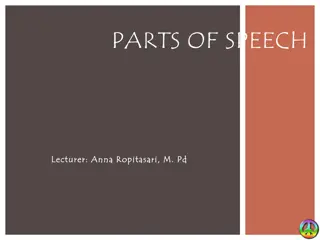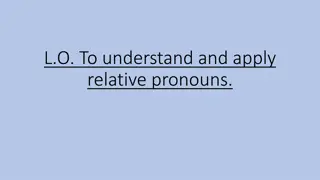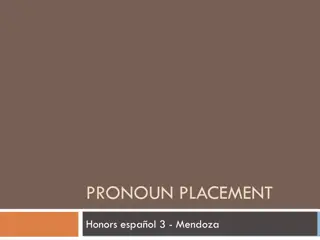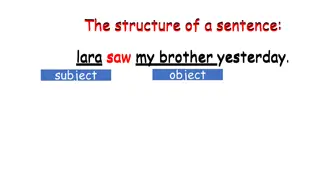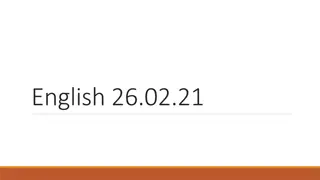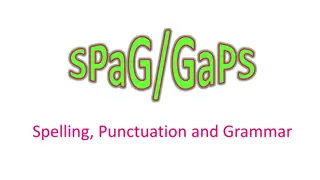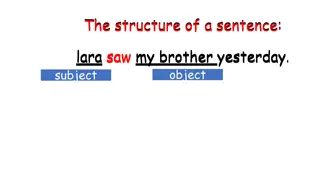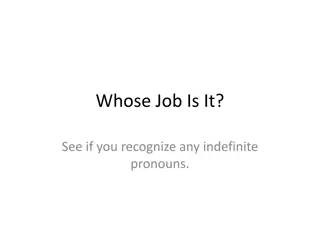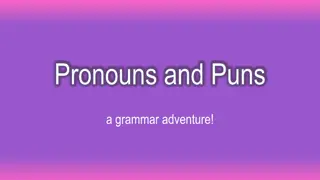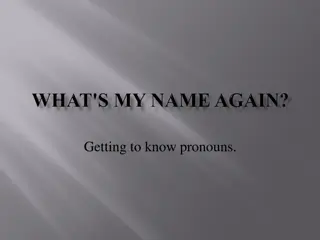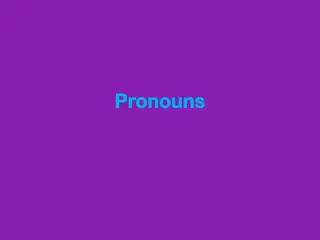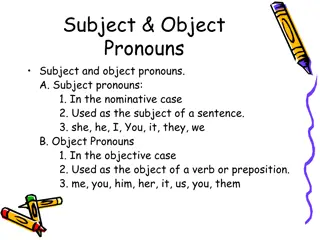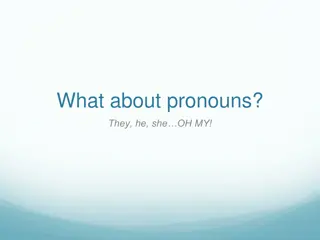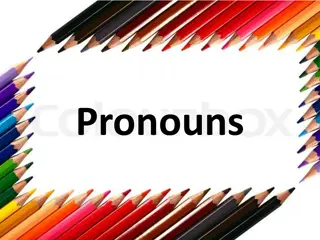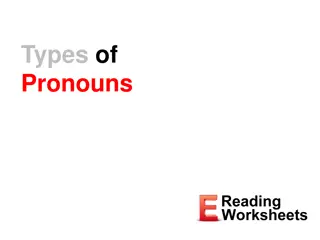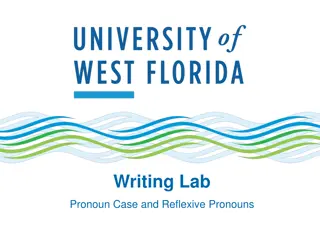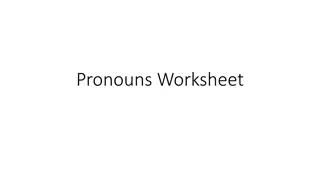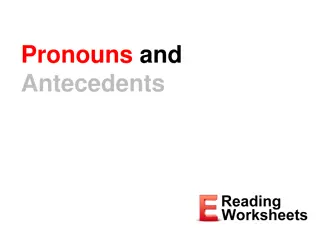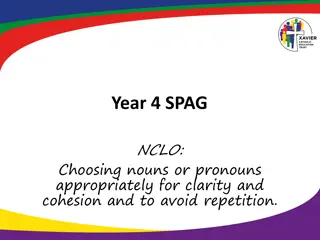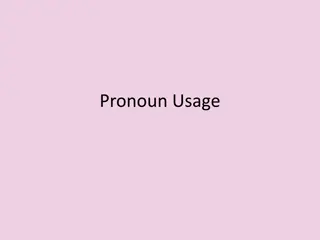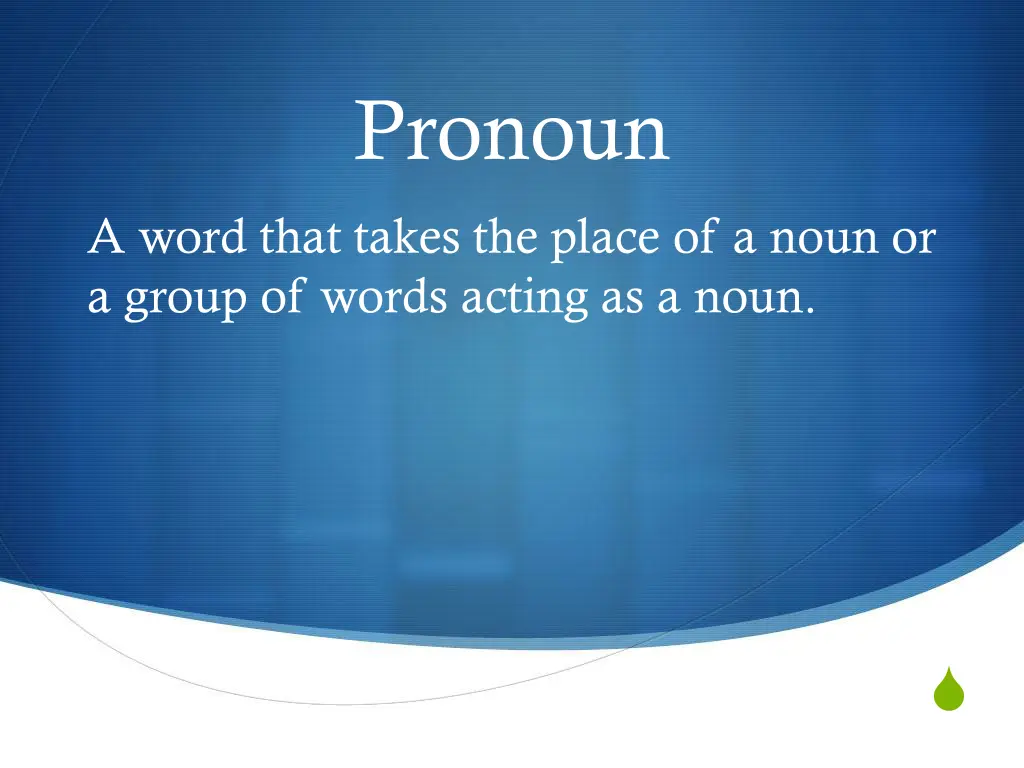
Pronouns: Types, Examples, and Usage Tips
Explore the world of pronouns - from subject and object pronouns to possessive and reflexive pronouns. Learn about antecedents and how to correctly use singular and plural pronouns. Enhance your understanding of personal pronouns with practical examples and exercises. Master the art of replacing nouns with pronouns efficiently in sentences.
Download Presentation

Please find below an Image/Link to download the presentation.
The content on the website is provided AS IS for your information and personal use only. It may not be sold, licensed, or shared on other websites without obtaining consent from the author. If you encounter any issues during the download, it is possible that the publisher has removed the file from their server.
You are allowed to download the files provided on this website for personal or commercial use, subject to the condition that they are used lawfully. All files are the property of their respective owners.
The content on the website is provided AS IS for your information and personal use only. It may not be sold, licensed, or shared on other websites without obtaining consent from the author.
E N D
Presentation Transcript
Pronoun A word that takes the place of a noun or a group of words acting as a noun.
Subject and Object Pronouns Subject Pronouns I, we You He, she, it, they Object Pronouns me, us you him, her, it, them Examples: (Incorrect) The firefighters described how the firefighters did the firefighters jobs. (Correct) The firefighters described how they did their jobs. **Be sure to name your noun BEFORE you replace it with a pronoun.
Possessive Pronouns: words used to show ownership My, mine, our, ours Your, yours His, her, hers, its, their, theirs Examples: My book is overdue at our library. 1. Look at their puppy; he is learning new tricks. 2. Your mother is very nice. 3. **Practice writing sentences using possessive pronouns.
Personal Pronouns: refers to the person speaking (first person), the person spoken to (second person), or the person, place, or thing spoken about (third person)
Singular pronouns Plural Pronouns 1st person: I, me, my, mine we, us, our, ours 2ndperson: you, your, yours you, your, yours 3rdperson: he, him, his, they, them, their, theirs she, her, hers, it, its Examples: The students received their awards at the ceremony. 1. She looked forward to finding the prize. 2. Why are you wearing those pants? 3. **Practice pg. 304 ex. 14 (old book)
Antecedents: the noun (or group of words acting as a noun) for which the pronoun stands/replaces 1. The firefighters described how they did their jobs. (Antecedent) (Pronouns) 2. The rescue worker appeared. She appeared to be unharmed. (Antecedent) (Pronoun) **Some pronouns will not have antecedents!** Also, double check yourself- replace the pronoun with the antecedent. Does it make sense? Most of the time it should!! Everyone knows what the truth is. The pronoun everyone does not have an antecedent because it is unclear who they are talking about. Practice pg. 303 ex. 13 (old book)
Reflexive Pronouns Reflexive Pronouns: refers to the subject and is necessary to the meaning of the sentence. reflexive (adj.) [grammar]: reflecting back on the subject, like a mirror We use a reflexive pronoun when we want to refer back to the subject of the sentence or clause. Reflexive pronouns end in "-self" (singular) or "-selves" (plural).
Reflexive Pronouns There are eight reflexive pronouns: SINGULAR myself yourself herself, himself, itself PLURAL ourselves yourselves themselves EXAMPLES: John saw me. (Does not refer to the same person) versus I saw myself in the mirror. (Reflexive because it refers to the same person) Why does he blame you? (Does not refer to the same person) versus Why do you blame yourself? (Reflexive because it refers to the same person)
Intensive Pronouns Intensive Pronouns: emphasize a noun or another pronoun and is unnecessary to the meaning of the sentence. In English, intensive pronouns are the same as reflexive pronouns, but an intensive pronoun is different from a reflexive, because the intensive pronoun can be removed without altering the meaning of the sentence. They are used to add emphasis to a statement; for example, "I did it myself."
Intensive Pronouns Look at these examples: 1. I made it myself. OR I myself made it. 2. Have you yourself seen it? OR Have you seen it yourself? 3. The President himself promised to stop the war. 4. She spoke to me herself. OR She herself spoke to me. 5. The exam itself wasn't difficult, but exam room was horrible. 6. Never mind. We'll do it ourselves. 7. You yourselves asked us to do it.
Demonstrative Pronouns: points out a specific person, place, or thing A demonstrative pronoun will generally appear at the beginning of a sentence, its antecedent later in the sentence. However, sometimes the demonstrative pronoun will be found after its antecedent. Singular pronouns: this, that Plural pronouns: these, those Examples: That has always been my favorite subject. 1. We met an EMT and a doctor. These were the most interesting speakers. 2. This is Carl s. 3. Practice pg. 305 ex. 15 (old book)
Relative Pronouns Relative Pronouns: Introduces a subordinate clause (sometimes called dependent clause) Every clause contains a subject and a verb not all clauses express complete thoughts Independent Clause: expresses a complete thought Subordinate Clause: does not express a complete thought RELATIVE PRONOUNS That Who Whose Which Whoever Whosever Whichever Whom Whomever
Relative Pronouns SIDE NOTE: Relative Pronouns introduce subordinate clauses, but so do subordinate conjunctions * Remember - A CONJUNCTION is a word that connects or joins together words, phrases, clauses, or sentences. SUBORDINATE CONJUNCTIONS After Since When Although So That Whenever As Supposing Where Because Than Whereas Before That Wherever But that Though Whether If Though Which In order that Till While Unless Who No matter Until Why What Even Though * Examples of independent versus subordinate conjunctions page 112 in new grammar book
Indefinite Pronouns: refers to a person ,place, or thing that is NOT specifically named Singular Plural Singular or Plural another much everyone some anybody neither everything few any anyone nobody little many more anything no one somebody others most each nothing someone several none either one something both all everybody other
Examples: Many of the students are on the honor roll. 1. Everything was in place before the guests arrived. 2. None of the jackets were his. 3. Several of the books looked interesting. 4. Practice pg. 307 ex. 17 (old book)
Interrogative Pronouns: words that are used to begin a question Most interrogative pronouns do not have antecedents. What, which, who, whom, whose Examples: What did the doctor say? 1. Which is the best treatment? 2. Who wants to be a doctor? 3. Practice pg. 306 ex. 16 (old book)


